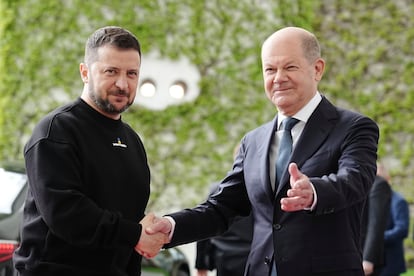Ukrainian president says counteroffensive does not aim to attack Russian territory
There has been speculation that Ukraine might try to capture areas in Russia proper and use them as bargaining chips in possible peace negotiations to end the war launched by Moscow in February 2022

Ukrainian President Volodymyr Zelenskiy said Sunday that his country is preparing a counteroffensive designed to liberate areas occupied by Russia, not to attack Russian territory.
Speaking during a news conference with German Chancellor Olaf Scholz in Berlin, Zelenskiy said Ukraine’s goal is to free the territories within its internationally recognized borders.
There has been speculation that Ukraine might try to capture areas in Russia proper and use them as bargaining chips in possible peace negotiations to end the war launched by Moscow in February 2022.
Pressed by reporters on the issue, Zelenskiy said: “We don’t attack Russian territory, we liberate our own legitimate territory.”
“We have neither the time nor the strength [to attack Russia],” he said, according to an official interpreter. “And we also don’t have weapons to spare, with which we could do this.”
“We are preparing a counterattack for the illegally occupied areas based on our constitutionally defined legitimate borders, which are recognized internationally,” Zelenskiy said.
The Ukrainian president is visiting allies in search of further arms to help his country fend off the Russian invasion, and funds to rebuild what’s been destroyed by more than a year of devastating conflict.
A Luftwaffe jet flew Zelenskiy to the German capital from Rome, where he had met Saturday with Pope Francis and Italian Premier Giorgia Meloni.
It is his first visit to Berlin since the start of the war and comes a day after the German government announced a new package of military aid for Ukraine worth more than 2.7 billion euros ($3 billion), including tanks, anti-aircraft systems and ammunition.
Zelenskiy thanked Scholz for Germany’s political, financial and military support, saying the country is now second only behind the United States in providing aid to Ukraine — and joked that he is working to make it the biggest donor.
Scholz made clear that Kyiv can expect German aid to keep flowing.
“We will support you for as long as necessary,” he said, adding that it is up to Russia to end the war by withdrawing its troops.
After initially hesitating to provide Ukraine with lethal weapons, Germany has become one of the biggest suppliers of arms to Ukraine, including Leopard 1 and 2 battle tanks, and the sophisticated IRIS-T SLM air-defense system. Modern Western hardware is considered crucial if Ukraine is to succeed in its planned counteroffensive against Russian troops.
Zelenskiy first met with President Frank-Walter Steinmeier, Germany’s head of state, who was snubbed by Kyiv last year, apparently over his previous close ties to Russia, causing a chill in diplomatic relations between Ukraine and Germany.
Since then, both Steinmeier and Chancellor Olaf Scholz have visited Ukraine, assuring Zelenskiy of their support for his country’s fight against the Russian invasion. Announcing the new arms package, German Defense Minister Boris Pistorius said Berlin would help Ukraine for “as long as it takes.”
After meeting Scholz and other senior officials at the chancellery, the two leaders are expected to fly to the western city of Aachen for Zelenskiy to receive the International Charlemagne Prize awarded to him and the people of Ukraine.
Organizers say the award recognizes that their resistance against Russia’s invasion is a defense “not just of the sovereignty of their country and the life of its citizens, but also of Europe and European values.”
While German leaders have expressed strong backing for Ukraine, German voters are divided on whether the country should provide further weapons, particularly advanced fighter jets of the kind Kyiv is asking its allies for.
Sign up for our weekly newsletter to get more English-language news coverage from EL PAÍS USA Edition
Tu suscripción se está usando en otro dispositivo
¿Quieres añadir otro usuario a tu suscripción?
Si continúas leyendo en este dispositivo, no se podrá leer en el otro.
FlechaTu suscripción se está usando en otro dispositivo y solo puedes acceder a EL PAÍS desde un dispositivo a la vez.
Si quieres compartir tu cuenta, cambia tu suscripción a la modalidad Premium, así podrás añadir otro usuario. Cada uno accederá con su propia cuenta de email, lo que os permitirá personalizar vuestra experiencia en EL PAÍS.
¿Tienes una suscripción de empresa? Accede aquí para contratar más cuentas.
En el caso de no saber quién está usando tu cuenta, te recomendamos cambiar tu contraseña aquí.
Si decides continuar compartiendo tu cuenta, este mensaje se mostrará en tu dispositivo y en el de la otra persona que está usando tu cuenta de forma indefinida, afectando a tu experiencia de lectura. Puedes consultar aquí los términos y condiciones de la suscripción digital.








































